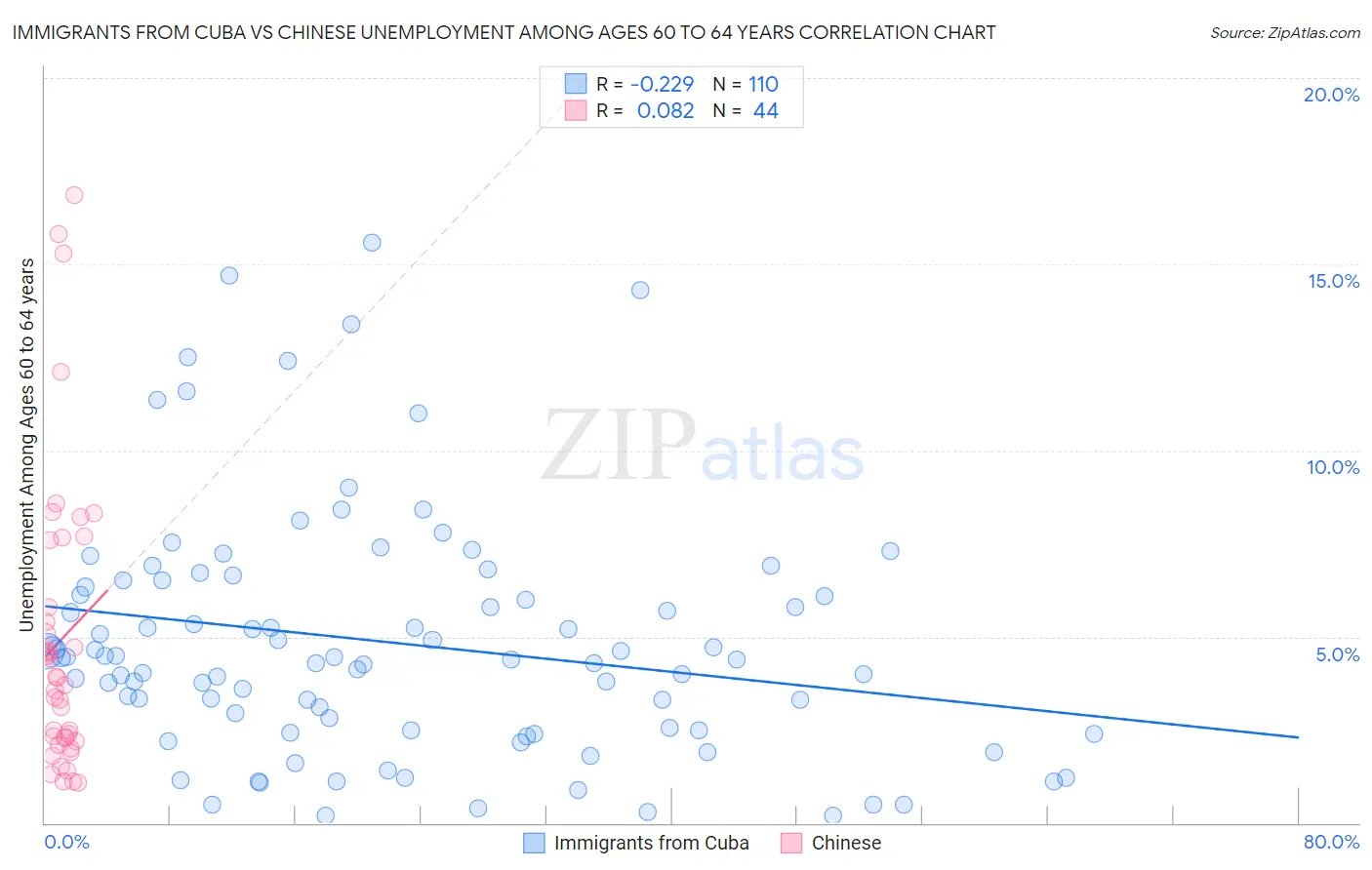Immigrants from Cuba vs Chinese Unemployment Among Ages 60 to 64 years
COMPARE
Immigrants from Cuba
Chinese
Unemployment Among Ages 60 to 64 years
Unemployment Among Ages 60 to 64 years Comparison
Immigrants from Cuba
Chinese
4.3%
UNEMPLOYMENT AMONG AGES 60 TO 64 YEARS
100.0/ 100
METRIC RATING
12th/ 347
METRIC RANK
4.0%
UNEMPLOYMENT AMONG AGES 60 TO 64 YEARS
100.0/ 100
METRIC RATING
3rd/ 347
METRIC RANK
Immigrants from Cuba vs Chinese Unemployment Among Ages 60 to 64 years Correlation Chart
The statistical analysis conducted on geographies consisting of 301,253,013 people shows a weak negative correlation between the proportion of Immigrants from Cuba and unemployment rate among population between the ages 60 and 64 in the United States with a correlation coefficient (R) of -0.229 and weighted average of 4.3%. Similarly, the statistical analysis conducted on geographies consisting of 62,952,421 people shows a slight positive correlation between the proportion of Chinese and unemployment rate among population between the ages 60 and 64 in the United States with a correlation coefficient (R) of 0.082 and weighted average of 4.0%, a difference of 8.1%.

Unemployment Among Ages 60 to 64 years Correlation Summary
| Measurement | Immigrants from Cuba | Chinese |
| Minimum | 0.20% | 1.1% |
| Maximum | 15.6% | 16.9% |
| Range | 15.4% | 15.8% |
| Mean | 4.8% | 4.9% |
| Median | 4.4% | 3.8% |
| Interquartile 25% (IQ1) | 2.5% | 2.2% |
| Interquartile 75% (IQ3) | 6.3% | 6.7% |
| Interquartile Range (IQR) | 3.8% | 4.4% |
| Standard Deviation (Sample) | 3.2% | 3.9% |
| Standard Deviation (Population) | 3.2% | 3.9% |
Demographics Similar to Immigrants from Cuba and Chinese by Unemployment Among Ages 60 to 64 years
In terms of unemployment among ages 60 to 64 years, the demographic groups most similar to Immigrants from Cuba are Chickasaw (4.3%, a difference of 0.050%), Norwegian (4.3%, a difference of 0.10%), Sudanese (4.3%, a difference of 0.60%), Danish (4.4%, a difference of 0.85%), and Luxembourger (4.3%, a difference of 1.0%). Similarly, the demographic groups most similar to Chinese are Hmong (4.0%, a difference of 0.42%), Immigrants from the Azores (4.0%, a difference of 0.43%), Fijian (3.9%, a difference of 2.9%), Immigrants from Congo (4.1%, a difference of 3.2%), and Lumbee (4.2%, a difference of 4.1%).
| Demographics | Rating | Rank | Unemployment Among Ages 60 to 64 years |
| Marshallese | 100.0 /100 | #1 | Exceptional 3.7% |
| Fijians | 100.0 /100 | #2 | Exceptional 3.9% |
| Chinese | 100.0 /100 | #3 | Exceptional 4.0% |
| Hmong | 100.0 /100 | #4 | Exceptional 4.0% |
| Immigrants | Azores | 100.0 /100 | #5 | Exceptional 4.0% |
| Immigrants | Congo | 100.0 /100 | #6 | Exceptional 4.1% |
| Lumbee | 100.0 /100 | #7 | Exceptional 4.2% |
| Immigrants | Micronesia | 100.0 /100 | #8 | Exceptional 4.2% |
| Indonesians | 100.0 /100 | #9 | Exceptional 4.2% |
| Immigrants | Bosnia and Herzegovina | 100.0 /100 | #10 | Exceptional 4.2% |
| Luxembourgers | 100.0 /100 | #11 | Exceptional 4.3% |
| Immigrants | Cuba | 100.0 /100 | #12 | Exceptional 4.3% |
| Chickasaw | 100.0 /100 | #13 | Exceptional 4.3% |
| Norwegians | 100.0 /100 | #14 | Exceptional 4.3% |
| Sudanese | 100.0 /100 | #15 | Exceptional 4.3% |
| Danes | 100.0 /100 | #16 | Exceptional 4.4% |
| Immigrants | Afghanistan | 100.0 /100 | #17 | Exceptional 4.4% |
| Slovenes | 100.0 /100 | #18 | Exceptional 4.4% |
| Tsimshian | 100.0 /100 | #19 | Exceptional 4.4% |
| Afghans | 100.0 /100 | #20 | Exceptional 4.4% |